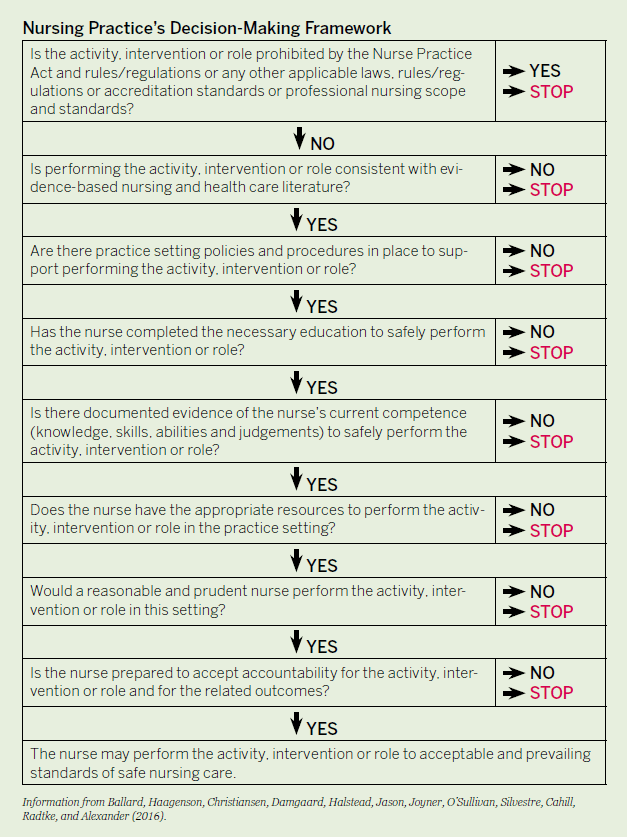- "My nurse told the parent that she wouldn't give the medication unless she had the prescription in its original container. Can she do that? The Mom was just trying to help by putting the meds in one of those weekly plastic containers."
- "My RN picked up the phone and took the doctor's order by talking to him. Is that OK?"
- "She said it was a 'nursing diagnosis.' What's with that? Doctors do the diagnosing, not nurses."
- "Our RN won't give allergy shots at camp; she wants those injections given at the local clinic. Last summer's nurse gave them. What changed?"
These comments, heard from camp professionals who are not nurses, may sound familiar. And since non-nurses — like camp directors — tend to supervise camp nurses, figuring out what a camp nurse may and may not do can be daunting. Interestingly, nurses sometimes wonder too. So how does one know what's allowed?
Answering the question begins by accessing the State's Nurse Practice Act. Nursing practice is governed by this; the content is often available online (remember to access the version from the state in which the camp is located). Most Nurse Practice Acts are written in broad terms; they often aren't explicit requiring one to interpolate, get the camp's attorney to figure it out, and/or consult the Board of Nursing when questions arise.
Recently, however, the National Council of State Boards of Nursing — a group representing all individual State Boards of Nursing — provided a helpful tool (National Council of State Boards of Nursing, 2016). Known as "The Scope of Nursing Practice Decision-Making Framework," the tool is a decision tree that steps through a series of questions to help determine answers to questions like those previously listed. The tool (see the table below) was developed by representatives from a host of nursing organizations and first published in the Journal of Nursing Regulation (Ballard, Haagenson, Christiansen, Damgaard, Halstead, Jason, Joyner, O'Sullivan, Silvestre, Cahill, Radtke, and Alexander, 2016).
That's nice, but how does a camp professional actually use it? Take the case of the nurse refusing to give medications that arrived in something other than the medication's prescription bottle. The decision tree's first question asks if the activity is prohibited by the State's Nurse Practice Act. Giving medication is not prohibited by Nurse Practice Acts, but it is often influenced by them. Specifically, medication is in the domain of a physician. Nurses may give medications if a prescriber directs them to do so, something that is addressed by a prescription's label and supported by written camp protocols. So, no, the activity of giving a medication isn't prohibited but . . .
The chart's second criteria references nursing's evidence-based literature. Giving medication is consistent with this. Indeed, nursing literature is specific about the responsibility a nurse assumes when giving medication to a client. Medication that isn't in its original container lacks some information; consequently, a nurse may (but doesn't have to) refuse to give medications that come to camp in other ways (e.g., baggies, various containers). This decision rests with the nurse. A nurse may not raise a concern if he or she recognizes the medication because of previous experience. However, nurses who lack this familiarity — or question something associated with dose or timing of the substance — are within professional practice parameters to refuse. Indeed, failure to do so may incur potential liability for the nurse. So, yes, a nurse may refuse to give a particular medication(s) when it comes to camp in something other than its original container.

The work-around is to provide parents with specific directions well before opening day as to how medications should arrive at camp. Such statements should also state that the camp's nurse may — note that word — refuse a medication that fails to follow directed practice. Readers interested in strengthening their camp's medication policy might talk about this with their nurse during the upcoming season. Readers can also access information from the Association of Camp Nurses' Practice Guideline "Medication Management for Day and Resident Camps" (2017).
How about the nurse refusing to give allergy injections at camp even though last season's nurse did so? In stepping through the decision framework, interesting elements come into play:
- The notion of giving an injection compliments most Nurse Practice Acts (assuming an MD has ordered it).
- Performing the activity — giving an injection — is supported by an evidence base and literature. However, giving an allergy injection has a certain twist. These injections risk an anaphylaxis reaction, so evidence and literature's recommended practice is that the shots be given at a facility prepared to manage that potential (American Academy of Allergy, Asthma & Immunology, 2017). Some camps cannot manage that; consequently, the decision stops here. Other camps have such personnel and equipment, in which case the decision process proceeds.
- The next step asks about policies and procedures that support giving allergy injections. If the camp has personnel and equipment to manage an anaphylactic reaction, the decision is a given and may be further supported by the prescribing physician's written instructions. (Some prescribing physicians' orders direct giving the allergy injection at a clinic or hospital, so be sure to read all provided documentation.) But some camps don't have an injection policy or their policy isn't broad enough to cover potentials associated with allergy injections. In such situations, the resulting "no" stops the process.
- The next criteria addresses the nurse's knowledge to safely give the injection. Nurses with allergy shot education gleaned from other practice settings may meet this, whereas nurses who've not learned about the allergy injection process would not. Consequently, here's another potential "stop/go" point. Assuming the nurse does have the education . . .
- The next assessment moves beyond education and knowledge to "documented evidence" to safely perform the task. This further separates camp nurses; some have such documented evidence while others do not. As before, the decision to give an allergy shot at camp will stop or proceed based on the nurse's evidence.
- The next decision focuses on having resources to perform the activity. Some clients bring needed supplies (e.g., allergy syringes) but others do not; some camps may have the supplies as part of their health center's inventory. But also consider the resources needed to manage an adverse outcome (e.g., anaphylaxis). First discussed in Step 2, these resources may include a physician comfortable with managing anaphylaxis at camp, oxygen, epinephrine, and/or IV supplies. This is often the stopping point for giving allergy injections at camp; however, it may not be if resources are, in fact, available.
- This leads to the next decision point, one predicated by what a "reasonable and prudent" camp nurse would do. All previous decisions should be considered as well as risks surrounding liabilities incurred by both the nurse and the camp. As before, this step may stop the action.
- The final step in the decision-making process focuses on the nurse's preparation to accept accountability for his or her action of, in this example, giving the allergy injection. Some nurses may accept that responsibility; others may not. Note that the nurse is the one who must accept the accountability. A camp may be implicated, but each nurse retains accountability for his or her professional behaviors.
Given a camp nurse's knowledge, experience, resources, and willingness to assume accountability, deciding to give the allergy injection has several places at which the process could stop or continue. The point is that the nurse — often in concert with the camp director because a bad outcome will probably result in litigation that would include the camp — moves through a mindful decision process. As a result, one can understand why last summer's nurse may have felt fine doing the injections at camp whereas this summer's nurse may not.
Camp professionals are urged to copy the decision-making tool provided here (see the table) and post a copy in the health center so all parties consider appropriate elements when determining if a nurse can do something. When doubt exists, consider moving through the questions with at least one other camp professional who may bring a different perspective to the discussion. In addition to the National Boards of Nursing's decision-making tool, the Association of Camp Nurses (ACN) recently updated the Scope and Standards of Camp Nursing Practice (2017). Camps that employ nurses should have this document in their health centers. It guides a nurse's camp practice by listing the standards to which camp nurses are held accountable. Each standard is supported by statements that illustrate competencies associated with it. For example, Standard 10, Collaboration, includes a competency that directs the nurse to work with camp leadership in providing health care to the camp community and another that directs the nurse to "engage in teamwork and teambuilding processes" to enhance the quality of healthcare initiatives.
Camp professionals — as well as campers, staff, and parents — should expect their nurse to adhere to what the standards direct. Interestingly, many nurses accept a camp position without becoming familiar with ACN's Standards and Scope of Practice statement. As a result, these nurses often try to impose practices from other job settings on the camp environment. Some of these may be a complement, but some can also trigger tension and/ or misunderstanding. Consequently, I strongly recommend making this publication available and, indeed, looking through it as a camp professional.
References
American Academy of Allergy, Asthma & Immunology (2017). Allergy injections administered by a nurse outside of a medical facility. Retrieved from aaaai.org/ask-the-expert/allergy-injection-administered.
Association of Camp Nurses (2017). Medication management for day and resident camps. Retrieved from acn.org/edcenter/acn_practice_guidelines_for_camp_nurses_in_the_us.php.
Association of Camp Nurses (2017). The scope and standards of camp nursing practice. Fisherville, KY: Association of Camp Nurses.
Ballard, K., Haagenson, D., Christiansen, L., Damgaard, G., Halstead, J.A., Jason, R.R, Joyner, J.C., O'Sullivan, A.M., Silvestre, J., Cahill, M., Radtke, B., and Alexander, M. (2016). Scope of nursing practice decision-making framework. Journal of Nursing Regulation, 7(3), 19-21.
National Council of State Boards of Nursing (2016). Scope of nursing practice decision-making framework. Retrieved from ncsbn.org/2016_Decision-Making-Framework.pdf.
Linda Ebner Erceg, RN, MS, PHN, is the program coordinator for Bemidji State University's Certificate in Camp Nursing (MN). Her experience includes over 30 years as a year-round camp nurse for Concordia Language Villages and deep experience in working with camp professionals to address camp health needs. She currently chairs ACA's Healthy Camps committee where her time at camp as well as her former role as executive director for the Association of Camp Nurses now contributes to her educational and research activities.


